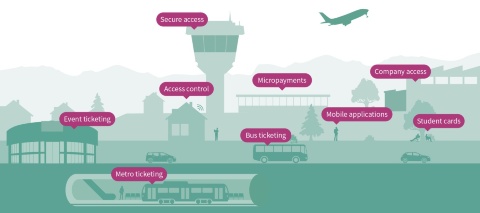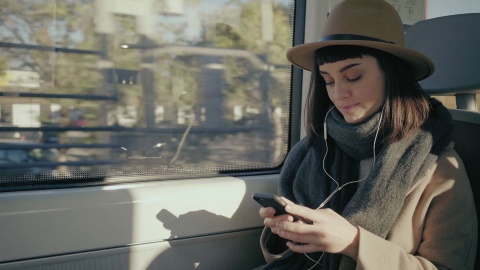
Today, there are seven and a half billion people living on earth. According to a study from the United Nations, we will count more than eight billion in 2030, and in 2050 we will be close to ten billion. Furthermore, the amount of people moving to the cities and large metropolitan areas is increasing. Career prospects, a rich culture and the amount of leisure activities offered attract many. Already more than half of the world population lives in cities and in 2030 it will be 60 percent of us. It is becoming increasingly tighter to live in a metropolitan area. In order to remain free and mobile, an important factor in urban development is a future-oriented public transport system with smart ticket solutions and digital payment options.
Our digitalized everyday life
Digitization is increasingly being integrated into our everyday lives and numerous routine tasks. We like our life to be as comfortable as possible and we are increasingly adapting our lives to the digital world: We read the morning news on the tablet, we order and pay for lunch online. Push notifications on the smartphone inform us about traffic jams and delays on our way home from work. We also buy tickets for the subway and tram through an app.
At the heart of this development are smartphones, tablets and smart wearables. They constitute an interface between the digital world and us. With the help of so-called mobile devices, we receive and share information and gain access to a wide range of services. This marks a growing trend: The days where we filled our purse with different cards and tickets are gone. „All-in-one” or „multiapplication“ are the keywords. We pay for all services such as the subway or the coffee-to-go with a single smart card or the smartphone. At the same time, we also gain access to the office building.
What does multiapplication mean?
Ticketing systems are increasingly being combined with other services. We even pay small amounts with the same card or smartphone app and identify ourselves. At the same time, we can collect loyalty points or gain access to buildings - such as the office building. Retailers, banks and governmental authorities are increasingly combining multiple applications on the smartphone. This trend towards multiapplication makes many offers more attractive. However, only when providers use secure, open and flexible systems, they convince with their services in the long run.

New digital payment options
Public transport is of particular importance to make cities attractive and livable. Modern technologies help to meet increasingly complex requirements. Now more than ever, we are looking for a comfortable mobility that goes beyond the traditional offer of a bus and a train. Car sharing and a bike rental at busy stations increase the possibility to stay mobile at all times. It is up to the providers to combine all the concepts and at the same time offer attractive and diverse payment methods.
Mobile tickets are increasingly replacing tickets for sports and cultural events as well as public transport tickets. NFC technology is also increasingly used in aviation and long-distance transport. Electronic information is read, transmitted and verified using smartphones or wearables. While the development of Near Field Communication has tended to progress slowly in recent years, a clear trend in this direction can be seen today. Although the US remained below expectations so far, NFC can already often be found in Europe and Asia. Especially in Japan and South Korea people like to pay the new way: contactless.

The most important facts about contactless payment
The digital age is revolutionizing the way we pay: Growth in online commerce and mobile apps are driving the demand for mobile payment opportunities. Especially in metropolitan areas fast and comfortable payment is of central importance. Paying with smartphones, wearables or contactless cards will increasingly replace cash. By 2020, more than 60 percent of transactions will be based on contactless technologies such as NFC. In addition to commerce, this trend is primarily focused on public transport. All over the world, transport companies are equipping their systems with standardized contactless ticket offers. Access to bus and train is thus simplified for everyone. This is called "payment while passing" - without charging a money amount, without PIN input and without contact.
However, mobile payment can become a gateway for criminals, if it is not adequately protected. This is why Infineon offers a wide range of chips that make mobile payment via smartphone and contactless cards faster, more reliable and more secure.
Read more about mobile payment

What is important for the future
A diverse and customizable ticketing system is of great importance to the transport of the future. Providers must always ensure that they also support new smart cards and mobile devices. Transport companies can hardly afford this requirement with proprietary ticketing systems. It is simply too complicated and too expensive. In order to remain flexible in the future, it is therefore important to establish so-called open standards. These can be shared by many transport companies and thus be further developed more efficiently. This is why Infineon is committed to the development of smart mobility solutions based on open standards. Only those transport companies whose ticketing system is flexible and secure are able to work future-oriented.
Why is security so important?
Connected, multi-functional mobile devices and new services make transactions more pleasant and faster. At the same time, they also open the door for unauthorized access to bank accounts, business and user data. This is why security in mobile applications is of highest importance. The transition from cards with magnetic strips to smart cards with chips has already shown how misuse can successfully be reduced. Today, every second of such payment cards worldwide contains certified chips from Infineon. These protect user data and transactions from unauthorized access and manipulation.
As a member of the OSPT (Open Standard for Public Transportation) Alliance, Infineon is also committed to greater security in public transport. With CIPURSE™ the alliance has developed an open standard that makes mobile ticketing and access control more secure. The algorithms used meet very high security requirements. Governments and airports also use these algorithms to protect access to secret information or sensitive areas. Already three airports of the Korea Airport Corporation currently rely on security chips from Infineon. Electronic access controls read the identity cards and allow access to authorized airport staff only.


On the go in Barcelona
A new ticketing system for the metropolitan area

Barcelona, Spain, Friday morning, 8:45 am: Linda Torres, 22, originally comes from Vilafranca del Penedès, about an hour from Barcelona. She studies economics at Universitat de Barcelona in the 3rd semester and is on her way to a lecture. Once again at the subway station the crowd is moving forward slowly. So she misses her train. „Hey Angela, could you please keep a seat for me next to you, I am 10 minutes late.“ Having her smartphone always in view her best friend Angela answers promptly: „Of course! By the way: Do you have any plans for this afternoon? I wanted to visit Park Güell with the German exchange students.“ Why not: „I would love to. After the lecture I still have the statistics seminar. Let’s meet at the subway station Vallcarca afterwards. But let’s discuss this later!“
Public transport is well-developed in Barcelona and offers a wide range of subway lines, trams, buses and trains of local and long-distance transport. As the second largest metropolitan region in Spain and a strong economic center, the city is attracting more and more people who at the same time have a demand for modern mobility. No one wants to wait in long queues at the turnstile at rush hour or to be stuck in traffic jams. That is why Barcelona is already preparing for tomorrow's requirements.
More comfort for five million people
„This is Michael and Lukas! And that's Linda.“ Having arrived to the subway station agreed on after the seminar, Angela introduces everyone to each other. It is a lovely warm day, the walk is completely relaxed and the view of the city breathtaking. „Wow!“, Lukas said excitedly. Barcelona is truly a pretty city with its numerous sights, bars and last but not least the beach. While everyone enjoys the view, Linda takes a look at her smartphone and scrolls through the local news: The transport company ATM (Autoritat del Transport Metropolità) plans extensive adjustments in the ticketing system. What Linda will only take as a side note is going to make the life of many inhabitants of the city easier in 2018.
In order to withstand the population growth and to be prepared for the future, the ATM, starting with the airport line, will comprehensively modernize its ticketing system. The project is called "T-Mobilitat". Tickets will then be available via app and smart card with an "all-in-one" offer. The subway, the toll urban highway as well as the bus, the rental bikes and the car parks will be accessible with only one smart card or the smartphone. The ATM can gradually and seamlessly implement the new ticketing system. This does not only make the transport company flexible, but also helps them reduce costs. The five million people in the metropolitan area in the meanwhile are going to experience the daily comfort and the great selection of electronic payment options.

Bus tickets from social services
Mobile and independent in old age

Angarsk, Russia, Friday afternoon, 5:10 pm: 71 years old Sergej Iwanow is living in the pretty little town since his apprenticeship as a carpenter when he was a teenager. He has two sons and four grandchildren. The youngest, Aleksandra, is ten and goes to an all-day school a few blocks from home. Her parents are both working full-time and they rarely come home before 7 pm. So it happens that Sergej often takes care of the child until the parents come home. He does not have a driver’s license. However, he likes to use the public bus system of the city. As a senior he is entitled to get a smart card from social services, which allows him to travel by public transport.
The necessary security components ensure that all data remains protected. Neither the movement profiles are transmitted to the social services, nor does the transport company gain insights into sensitive data. The intelligent ticketing system offers monthly, annual and simple one day tickets not only in Angarsk and Izhevsk. Two million people in seven other Russian metropolitan regions benefit from it. The system enables high security and is cost-effective for the operator at the same time. It was implemented by Udobny Marshrut, the second-largest integrator of automated fare collection in Russia.
An advantage for students
„Are you hungry, do you want me to make you something to eat? “ Sergej is a very attentive grandfather and caring for Aleksandra with pleasure. She also uses the bus every day and benefits from a smart card from social services. As a student, she is also entitled to use public transport on special terms. This is a great benefit for her parents too.
The passengers' encrypted tickets are stored in the system and can be verified quickly. To determine the validity, the personnel simply reads the customer information or checks the identity card. In addition the public transport company can always add further features to the app, such as a timetable. This is how Aleksandra and Sergej have an even better overview of how to be mobile in the city.

Mobile tickets in ferry service
Easy boarding

Steilacoom, USA, Friday evening, 8:30 pm: Peter Johnson, 28 years old, employee in an advertising agency in Seattle and his girlfriend Susan Cohen, 27 years old, nurse in a small town in California, enjoy a long weekend. Due to their long-distance relationship, they usually only see each other on Saturdays and Sundays. However, Peter has planned something special for their third anniversary. So they have both taken Friday off. Ketron Island, not far from Steilacoom on the US west coast, is a small natural island. Even as a child, Peter often came here with his parents. Together with Susan he now spent one day in the midst of the idyllic landscape. Once again, they take the ferry back to the mainland. Especially the modern ticketing system makes sure that Peter and Susan feel comfortable with both the boarding as well as the ride itself.
Higher security and better data protection
Passengers at HMS Ferries benefit from a ticketing system based on open standards and security chips from Infineon. Depending from what they prefer passengers can buy either smartphone tickets or paper tickets. In addition they can purchase corresponding QR codes online or at the ferry port. The advantage of this is that the boarding process is speeded up considerably thanks to fast ticket validation. Security is enhanced, data protection is improved and abuse risk is minimized. The trend toward account-based ticketing systems for public transport gains increasingly greater importance in the US.
After a short ride, Peter and Susan arrive relaxed in Steilacoom and look back on their successful and particularly beautiful day. They are now feeling hungry, so they set out for downtown Seattle for dinner. „I really want pizza!“ As a completion of a pleasant day Peter and Susan drive to their favorite Italian restaurant where they let the day end comfortably.
In short: What are open standards and how does Infineon contribute?
A world that is rapidly developing and relies on a mobile infrastructure is confronted with numerous incompatible operating systems and little flexibility. To change this is the task of open standards. Current public transport systems are often based on a specific vendor and its hardware. To maintain and develop such systems is not only time-consuming, but also expensive. Long-term trust in a single system provider leads to reduced flexibility, which in turn makes it difficult to implement new technologies quickly. The rapid spread of NFC-based ticketing systems once again shows the disadvantages of inflexible proprietary systems.
Many companies are facing the decision to leave their closed systems in the long run and to use open standards instead. These can be quickly adapted and adjusted to their own needs. The OSPT Alliance has therefore developed the open standard CIPURSE™ with more than 70 members. Transport companies can rely on a pool of technology providers, experts and system integrators to set up payment systems for local public transport. Infineon offers the broadest product range of different solutions. The technology company makes ticketing in public transport more secure, flexible and meets the requirements of the future.
CIPURSE can be easily integrated into both mobile and card-based systems.“

Last update: July 2017



